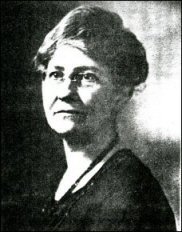|
 |
|
 |
Wednesday, December 29, 1948
This is all very interesting and true. We like to think that in the great big world far from this wilderness settlement, there were those willing to provide the food which every living soul needs for its growth. But, perhaps because I am a descendant of pioneers, another kind of religious gathering which was inaugurated a couple of years later, appeals to me more. Here with the great trees still standing not far away in the little log house of Luke Brown at what we now refer to as "The Center," a Methodist class was organized.
"At my washstand I thrust my nose against a solid body of ice. I then seized a toothbrush, but on applying it the bristles seemed to have changed into adamantine solidity and the violence with which they came into contact with my teeth rendered it doubtful whether I should not have to apply to your friend Doctor Monsieur Dichman for an artificial set." So much for temperature in 1816 in the North Country.
The writer thus describes the various stages of his journey coming to this town: "There is no doubt that the County of St. Lawrence from its local situation will have the exclusive benefit of the surplus population of the Eastern States." I am coming to the matter which I started to describe in the first place, viz religious conditions existing in pioneer days.
He tells in his letter of attending services at which time an itinerant clergyman preached. He was one of many who were sent by missionary establishments at New York and other great cities. Said he, "While on the subject of church establishments, I must notice that David is about building one at Ogdensburg and another at Antwerp, and he has made arrangements with Bishop Hobart of New York for endowing them with regular church benefices whenever the funds admit it. "The Bishop referred to was of the Episcopalian faith. George Parish describes the approach to Parishville in his letter thus: "After some ascents through groves of pines interspersed by villages and by small streams in which fish abounded, particularly trout" (Barton and Alder Meadow Brook), a sudden turn brought us on a high commanding ground (the Dugway), and in full view of a building classically correct surmounted by a couple and intended for a public school. Further on are detached dwellings inhabited by settlers and tradespeople, but the most distinguished building is one of three stories, destined for an inn—a building which for outward appearance and interior accommodation would have been most appropriately placed in New York or Philadelphia. "The Parish inn became an important stopping place for the old stage coaches and burned in 1854.
And there until March 10, 1828 they met for worship, meditation and prayer. During that year a Methodist Society was organized by Bishop Elijah Hedding, D. D., dedicating the church built that year with Rev. Ezra Healy as the first pastor. That first Parishville church stood across the State Road from Chapel Hill Cemetery. Later it was moved to this village and erected on land given by Dr. Francis Parker. It still stands and is used as a chapel. The auditorium was built onto it several years later. It is the place of worship used all winter every year and for suppers and Sunday school the year around. It is 120 years old. We can imagine those bygone meetings when folks took their religion very seriously, when they believed every word of their Bible literally and went to this little place as a haven for their souls, after the vigorous wrestlings with nature in building their homes in this wilderness so far from the wider haunts of men. Here the old-time "revivals" took place—here they brought their dead for the final ceremonies before the grave claimed them. Piously, believing they listened to the earnest men who preached to them the Word, not always eloquently, but in a way to satisfy their spiritual needs and which enabled those early pioneers to keep the faith and build their community on a "firm foundation," for most of them were descendants of those first Puritans who founded not only their State but the nation upon which we have placed our pride, our faith, and or happiness. Truly all who worship in this old church tread on sacred ground made so by "the faith of our fathers" which was a reality to them, a never failing source of strength and courage. Their dust reposes in the cemetery across the way, but it must be that some of their devotion remains in the very walls of their old meeting-house.
|